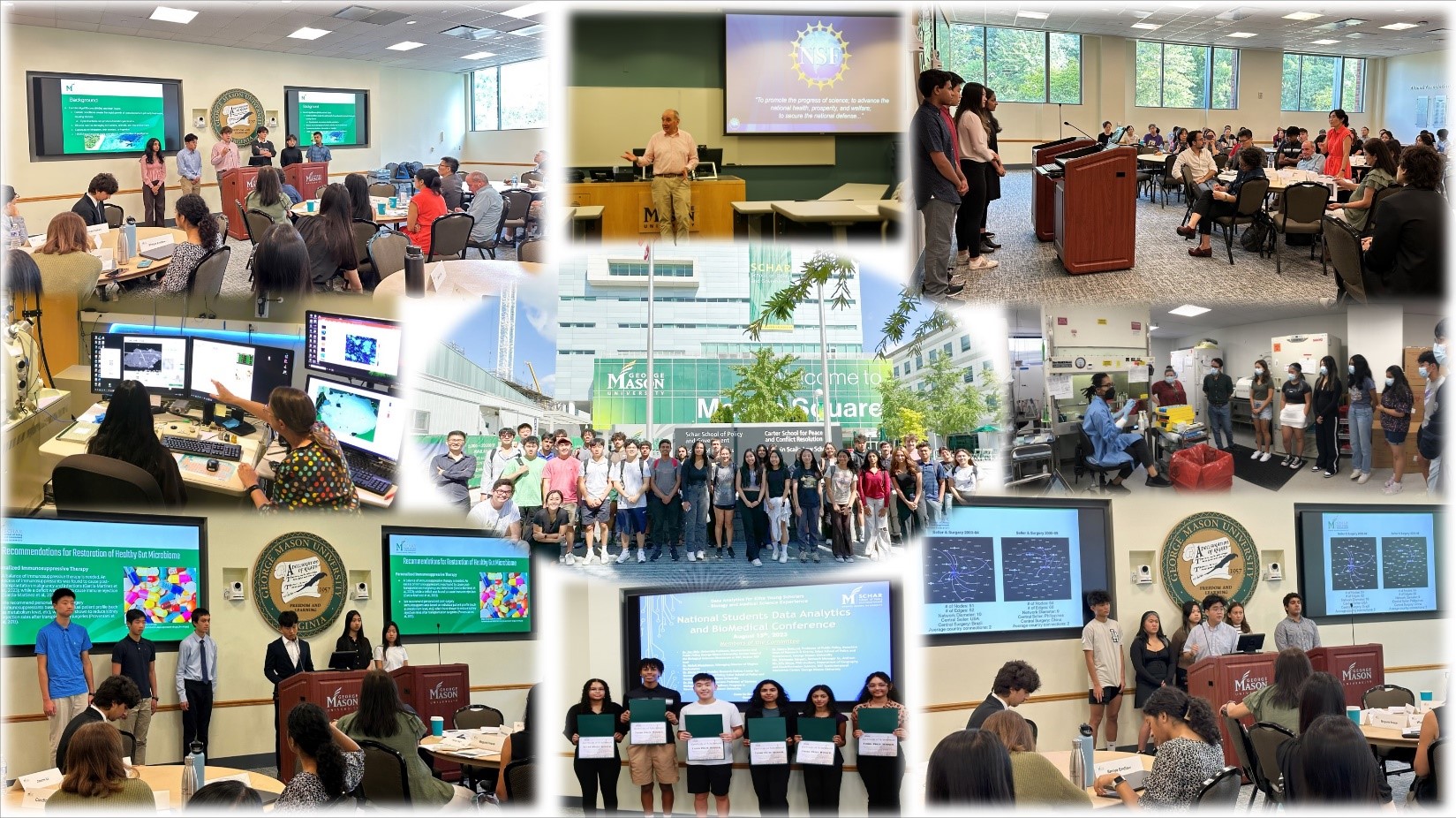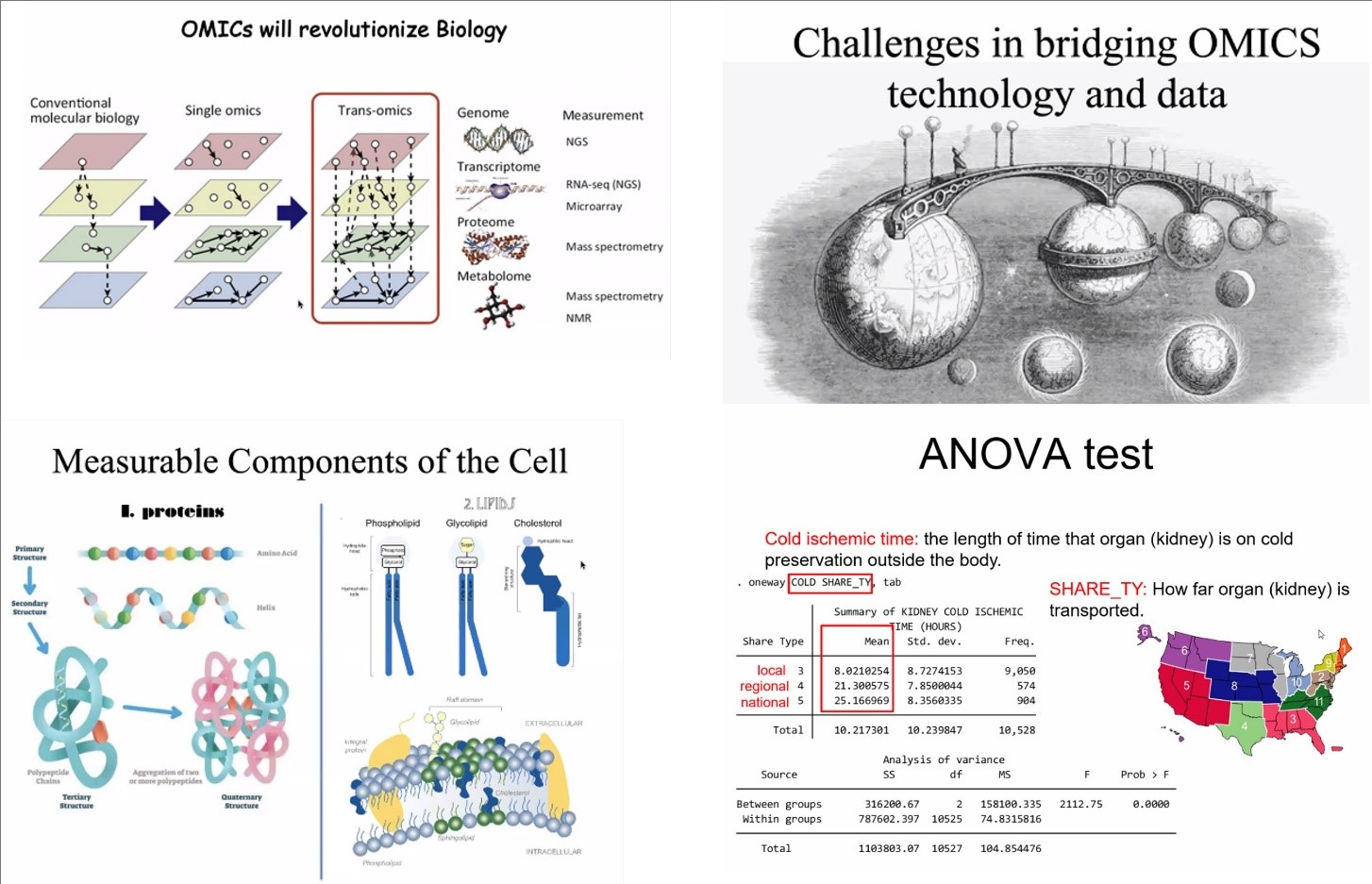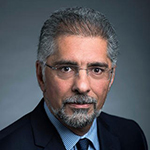Summer 2024
The Center for Biomedical Science & Policy (CBSP)
Schar School of Policy and Government
George Mason University
Location: Virtual and two Conferences on-site at George Mason University Arlington Campus
Course Dates: Saturday, June 15th – Fri, July 12th,2024
The internship program consists of:
- Four Saturday Virtual Meetings – Sat, June 15th – Sat, July 6th 2024; Noon to 2:00pm EST; 9:00am - 11:00am PST;
- Weekly Research Assignment with Ph.D. Research Assistants’ support;
- Research Project Feedback and office hour, June 15th – July 12th 2024, on Tuesdays by RSVP; 7:00 p.m. - 8:00 p.m. EST; 4:00 p.m. – 5:00 p.m. PST;
- One-week on-site lab research (July 8th - July 12th, 2024) at National Science Foundation (NSF), National Institutes of Health (NIH); Cosmos ID; George Mason University - The Biomedical Research Lab (BRL); The Center for Applied Proteomics and Molecular Medicine; Institute for Digital Innovation (IDIA); George Washington Hospital (Ron Paul Kidney Center), etc.
- National Students Data Analytics and BioMedical Conference (NSDAB) (July 12th, 2024): Students will work under different teams to present their research papers during the NASDAB conference. A committee of NIH, NSF, and BioMedical Industries experts will select the best research project and top-performing team for scholarships and awards.
- Each student will receive two tickets for family and friends to attend the conference.
- Hybrid option is available for out-state students to participate.
*Commute buses will be provided between campus and on-site study labs.
Registration Fee
- We can only accept 30 students this summer. Available seats are on a first-come, first-served basis.
- Please email execed@gmu.edu for application and program fees.
- Need-based scholarships are available.
Certification
Students who successfully finish the program will receive a Center for Biomedical Science & Policy (CBSP) Young Scholars Research Program Certificate of Completion, National Students Data Analytics and BioMedical Conference Awards, and Scholarships.

Program Summary
The Young Scholars Research Program is tailored for high-achieving high school and undergraduate students aspiring to delve into the realms of biology or medical science, with a strong focus on advanced data analytics. Participants will have the unique opportunity to collaborate with esteemed faculty members from GMU, forming interdisciplinary teams comprising 3 to 4 individuals encompassing both high school and undergraduate students.
At the outset of the program, students will be assigned to specific team projects based on their indicated preferences. Each team is expected to produce two significant outputs by the program's conclusion. Firstly, a final paper showcasing their research findings will be published on the Center for Biomedical Science & Policy (CBSP) website and the Schar School Young Scholars Journals Webpage. Secondly, teams will present their projects at a conference where students have the chance to compete for prizes.
Throughout the program, participants will engage in hands-on research projects employing a variety of methodologies. This may include but is not limited to, biostatistics utilizing R or Stata, data visualization employing QGIS or ArcGIS, and network visualization using tools like Gephi. The comprehensive nature of the program ensures a rich and immersive experience for students passionate about advancing their understanding and skills in the fields of biology and medical science.
Program Goals
Each participant will lead a project with peers and advanced-level BS and graduate students. Transit students become proficient in research tools and applications and ways to incorporate data analysis into the students’ own biomedical context research projects. The program will provide access for students to work on real data sets and create solutions on real-world issues through professional data science, programming, and statistics apps.
Specifically, the participants will learn:
- How to frame research questions,
- How to access to/collect necessary data,
- How to analyze data to answer the research questions at hand,
- How to structure and prepare professional reports/publication manuscripts based on the data analysis results, and
- How to present your research outputs in a professional setting.
Program Benefit
- Earn experience and share views on the applications of biomedical research with policy researchers, computer scientists, biomedical scientists, and industry representatives during national conferences.
- Gain valuable teamwork experience and explore possible career paths
- Networking with national wide awardees in Biomedical Science and Data Analytics.
- Develop and refine skills for resume
Research Projects Highlights and Features
Our Course Directors Dr. Jim Olds, Dr. Naoru Koizumi, and Project Advisors, Dr. Ali Andalibi, and Dr. Megumi Inoue will lead students to work on the research projects in the areas such as:
- Bibliographic analysis of biology and medical field publications;
- Spatial and statistical analysis to investigate disparities in disease prevalence and access to medical treatment;
- Statistical analysis to infer factors determining medical and environmental policy effectiveness;
- Network analysis to elucidate links among different bacteria, diseases and other agents; and
- Biostatistics to identify optimal treatment regimens for various chronic diseases.

The final paper will be published on the Center for Biomedical Science & Policy (CBSP) website as well as the Schar School Young Scholars Journals Webpage.
Summer 2024 Tentative Research Projects Include:
- Project 1: Health-related quality of life (QOL) linked to the gut microbiome in dialysis patients
- Project 2: Determinants for international human plasma exchanges
- Project 3: Trend for organ supply in the opioid crisis era
- Project 4: Bias in Large Language Model (LLM) for Transplantation Publications
- Project 5: Drug trafficking analysis using Network analysis and GIS
- Project 6: Bioinformatic analysis of the molecular evolution of protein kinase C in eukaryotes.
Scholarships: Each winning team member from the National Students Data Analytics and BioMedical Conference will receive a $500 scholarship that can be applied to any advanced-level BioInformatics internship programs at the Schar School during the academic years 2024 and 2025.
About the Course Directors

Dr. Jim Olds is University Professor of Neuroscience and Public Policy at George Mason University. He served from 2014-2018 as head of the Biological Sciences Directorate at the U.S. National Science Foundation (NSF), responsible for an annual budget of $750M. Olds’ former directorate funds the majority of non-biomedical research at America’s research institutions. While there, he was also NSF lead for President Obama’s White House BRAIN project, deputy lead for NSF on Vice President Biden’s Cancer Moonshot and co-chaired the White House Life Sciences Subcommittee of the National Science and Technology Council. Prior to his time at NSF, Olds was the Director of George Mason University’s Krasnow Institute for Advanced Study, Chair of the Molecular Neuroscience Department and the Shelley Krasnow University Professor of Molecular Neuroscience. Olds received his Ph.D. in neuroscience from the University of Michigan and his BA in chemistry from Amherst College.

Dr. Naoru Koizumi is Professor of Public Policy and Associate Dean of Research & Grants in the Schar School of Policy and Government at George Mason University. She specializes in medical policies, particularly in the fields of organ transplantation and the end-stage kidney and liver diseases. Her research focuses on the applications of various quantitative methods such as biostatistics, Geographic Information Systems (GIS), simulation and mathematical optimization to analyze various clinical and policy questions related to organ transplantation and other chronic disease treatments. Her projects funded by NIH and NSF include simulations and optimizations of organ allocation (NIH-R21) and bed allocation in a mental health system (NIH-R21 & R01), simulation of slum expansion in India (NSF) and mathematical analysis of illicit kidney trade networks (NSF).
Koizumi completed her first doctoral program in Regional Science from the University of Pennsylvania in 2002. Her second PhD (2005) is in Environmental and Preventive Medicine from Hyogo College of Medicine, Japan.
Additional Project Advisors

Dr. Ali Andalibi Senior Associate Dean in the College of Science and a Chief Scientific Officer at the Center for Infectious Disease Research. He is a molecular biologist and geneticist by training, with a very broad, multidisciplinary background that includes nearly three decades of research into the genetics and molecular mechanisms of metabolic and inflammatory diseases.

Dr. Megumi Inoue Associate Professor, Department of Social Work, College of Health and Human Sciences. Her research focus is primarily on older adults with declined health who are vulnerable to losing autonomy and dignity. She brings her extensive clinical experience as a social worker and a registered nurse to her understanding of the research field.
Project Advisors and Leads

Dr. Meng-Hao Li is a Postdoctoral Research Fellow at George Mason University's Center for Biomedical Science and Policy. His expertise lies in health informatics and e-health policy, where he adeptly employs text mining, machine learning, and network analysis to address his research inquiries. Dr. Li completed his PhD at George Mason University in 2022 and was honored with the Joseph L. Fisher Public Policy Award. With a collaborative spirit, he has engaged with over 20 scholars, resulting in the publication of more than 30 research articles. Dr. Li's involvement extends to national health databases, including N3C, HCUP, and UNOS, which collectively encompass data from over 10 million patients and hundreds of millions of records.

Dr. Mehdi Mayebpour, Managing Director of Virginia BioAnalytics
Mr. Patrick Baxter is a Public Policy PhD Candidate and Graduate Research Assistant at the Schar School of Policy and Government with nine years’ experience as a practicing quantitative researcher. His current research focuses on domestic healthcare policy, and his dissertation centers around CMS inpatient evaluation methodologies. He has contributed to research on organ transplantations and other chronic disease treatments, ChatGPT sentiment, vehicle safety, identifying drug trafficking networks, government partner selection and emergency relief management since attending Schar. He has lived and worked in various countries over his career, including Malawi, Rwanda, Indonesia, Mozambique, and the US. During this time, he assisted on a broad set of poverty alleviation research topics. These include household financial welfare, agricultural input adoption, family planning, maternal health, rural teacher retention, tax collection, and community conflict resilience.

Mr. Zifu Wang is currently dedicated to his Ph.D. in the field of geographic information science at George Mason University. Zifu has been working as a graduate research assistant at the NSF Spatiotemporal Innovation Center, a collaborative effort involving GMU, Harvard, and UCSB. Zifu has published more than 10 research articles in the domains of data mining, social media analysis, cloud computing, big data computing, and natural language processing. He is presently engaged in an investigation of the illicit kidney trade network through the analysis of news media data. Additionally, he oversees the management of a computing cluster, encompassing cloud computing, big data platforms, and High-Performance Computing (HPC) platforms.
